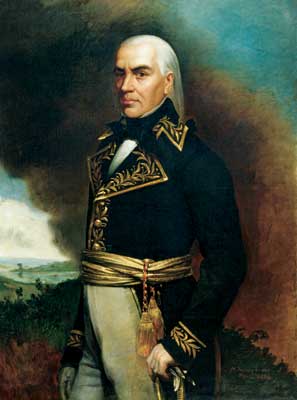Simón Bolívar
Simón Bolívar (24 July 1783 – 17 December 1830) was a Venezuelan military and political leader who played a central role in the South American independence movement from the Spanish Empire. Often referred to as El Libertador, he led the fight for independence in what are now the countries of Venezuela, Colombia, Ecuador, Peru, Panama, and Bolivia. His significant contributions to the liberation of these countries from Spanish rule have made him a pivotal figure in the history of Latin America.
Early Life[edit | edit source]
Simón José Antonio de la Santísima Trinidad Bolívar y Palacios was born in Caracas, in the Captaincy General of Venezuela, part of the Spanish Empire. Orphaned at a young age, Bolívar was sent to Spain in 1799 for his education, where he was exposed to the Enlightenment ideas. He returned to Venezuela in 1807.
Military Campaigns[edit | edit source]
Bolívar's quest for South American independence began in earnest with the Venezuelan Declaration of Independence in 1811. However, it was not until the Battle of Boyacá in 1819 that he secured a significant victory, leading to the establishment of Gran Colombia, a state that encompassed much of northern South America.
Bolívar's military campaigns covered a vast geography, from the Amazon Rainforest to the Andes Mountains. His most notable campaigns include the crossing of the Andes in 1819 to liberate New Granada (present-day Colombia), and the subsequent liberation of Venezuela, Ecuador, Peru, and Bolivia. The Battle of Carabobo (1821), the Battle of Pichincha (1822), and the Battle of Ayacucho (1824) were among his most decisive victories.
Political Leadership[edit | edit source]
As a political leader, Bolívar dreamed of uniting South America as a single federation, similar to the United States. He served as President of Gran Colombia (1819-1830) and dictator of Peru (1823-1826). Despite his efforts, the vast distances and regional differences hindered his vision of a united South America. His dream of integration remained unfulfilled, as Gran Colombia dissolved into separate nations shortly after his death.
Legacy[edit | edit source]
Simón Bolívar's legacy is profound and multifaceted. He is revered as a liberator and a visionary who sought to unify South America. Numerous statues, cities, and countries bear his name, and his life and achievements are celebrated across the continent. The currency of Venezuela, the Bolívar, is named in his honor.
Bolívar's vision for Latin America continues to inspire political and social movements, reflecting his enduring influence on the continent's identity and aspirations.
Death[edit | edit source]
Simón Bolívar died on 17 December 1830 in Santa Marta, Gran Colombia (present-day Colombia), from tuberculosis. His death marked the end of an era in South American history, but his legacy as El Libertador endures.
Search WikiMD
Ad.Tired of being Overweight? Try W8MD's physician weight loss program.
Semaglutide (Ozempic / Wegovy and Tirzepatide (Mounjaro / Zepbound) available.
Advertise on WikiMD
|
WikiMD's Wellness Encyclopedia |
| Let Food Be Thy Medicine Medicine Thy Food - Hippocrates |
Translate this page: - East Asian
中文,
日本,
한국어,
South Asian
हिन्दी,
தமிழ்,
తెలుగు,
Urdu,
ಕನ್ನಡ,
Southeast Asian
Indonesian,
Vietnamese,
Thai,
မြန်မာဘာသာ,
বাংলা
European
español,
Deutsch,
français,
Greek,
português do Brasil,
polski,
română,
русский,
Nederlands,
norsk,
svenska,
suomi,
Italian
Middle Eastern & African
عربى,
Turkish,
Persian,
Hebrew,
Afrikaans,
isiZulu,
Kiswahili,
Other
Bulgarian,
Hungarian,
Czech,
Swedish,
മലയാളം,
मराठी,
ਪੰਜਾਬੀ,
ગુજરાતી,
Portuguese,
Ukrainian
Medical Disclaimer: WikiMD is not a substitute for professional medical advice. The information on WikiMD is provided as an information resource only, may be incorrect, outdated or misleading, and is not to be used or relied on for any diagnostic or treatment purposes. Please consult your health care provider before making any healthcare decisions or for guidance about a specific medical condition. WikiMD expressly disclaims responsibility, and shall have no liability, for any damages, loss, injury, or liability whatsoever suffered as a result of your reliance on the information contained in this site. By visiting this site you agree to the foregoing terms and conditions, which may from time to time be changed or supplemented by WikiMD. If you do not agree to the foregoing terms and conditions, you should not enter or use this site. See full disclaimer.
Credits:Most images are courtesy of Wikimedia commons, and templates, categories Wikipedia, licensed under CC BY SA or similar.
Contributors: Prab R. Tumpati, MD





